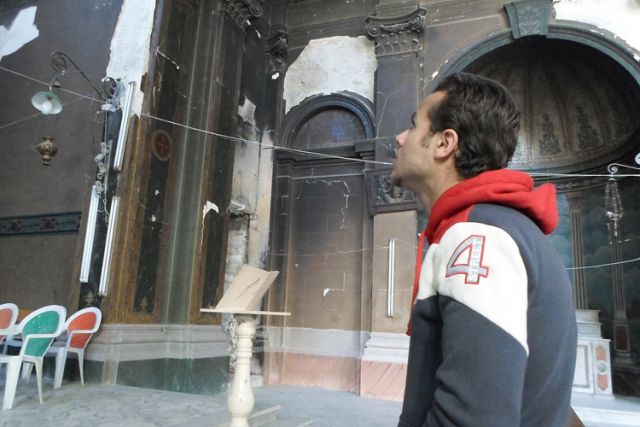In separate interviews with Catholic News Service, Copts -- the name for Egypt's indigenous Christians -- agreed that that their nation was facing major difficulties, including turmoil and violence, which had touched their personal lives in some way.
Most of 12 interviewees, from a variety of professional and educational backgrounds, expressed similar concerns that Coptic immigration to the West was endangering the community's historic presence in the North African country, where Christians make up about 10 percent of an estimated 85 million people and constitute the Middle East's largest Christian minority.
But they offered different views over whether they thought they were being targeted for their faith and, if so, over whether the situation was worse now than it has been in the past.
"There have always been difficulties," said Father Kamil William, professor of Old Testament at Cairo's Faculty of Religious Sciences, which is run by Egypt's Catholic patriarch and bishops.
He refused to use the word "persecution," which he described as "a systematic ... institutionalized attempt to harm an ethnic group."
"This is not the case here. There is discrimination, but that is on a person-to-person level, it is not institutionalized, and usually depends on the person you are dealing with," said Father William, who lives in Cairo but is originally from Egypt's Assiut region in the middle of the country.
He said that what had changed since the 2011 revolution was that some "(extremist) Muslims are ... no longer hiding what they feel."
Father William said examples of this were the attacks last August on dozens of Christian churches and properties around the country, perpetrated by "extremist Muslim elements ... angry at Copts for their support of the army" and its ouster last July of President Mohammed Morsi, an Islamic conservative.
In early February, the Vatican's apostolic nuncio to the United Nations, Archbishop Francis A. Chullikatt, told a U.S. congressional hearing that "flagrant and widespread persecution of Christians rages in the Middle East even as we meet."
While this could be said for Syria, Iraq, and to an increasing extent Libya, it was not true for Egypt, said Dominican Father John Gabriel Khalil, who comes from the southernmost region, Aswan.
"In Egypt it is discrimination," said Father Khalil, who teaches dogmatic theology at the Catholic Institute of Catechism in Cairo.
He said that among the most serious problems facing Christians were a lack of job opportunities, freedom and democracy, which many Muslims suffered from as well.
"They are problems of human rights and these are problems of Muslims, also. Yes, a poor Christian has problems finding a job, but a poor Muslim is discriminated against also and cannot find a job without 'koussa,'" he said, using the Arabic term for bribery, a practice often needed to get jobs in Egypt.
Both priests cited poverty and ignorance as the main instigators of Muslim-on-Christian violence and said they were opposed to the emigration of Egypt's Christians.
"The majority (of Christians) who are leaving are the rich, and the poor stay, and there is no one to help them. You are rich and you save only yourself, you don't stay and try to help" improve the country for all Christians, many of whom are impoverished like millions of their Muslim compatriots, said Father Khalil.
For Istafanos Youssif, a university student from the port city of Suez, the option of leaving was not one he could afford, but one he said he understood.
The 21-year-old said that poor and other lower-middle-class Egyptians like him sought to emigrate because Egypt could not provide them the most basic necessities of life: food and stability.
"How can you love a place that does not provide you even these," he asked.
He said he was uncertain about the future of Christians -- or anyone for that matter -- in Egypt, where widespread "poverty and illiteracy" had created "fertile ground" for intolerance, extremism and violence.
He added that the "general state of insecurity ... and chaos" in post-revolution Egypt meant Muslims and Christians alike were now "living on the edge, where something can happen to us at any time."
It was "impossible to understand" who was really behind the anti-Christian attacks in the country, including those last August that left the two Catholic churches he attended in Suez burned and in ruins, said Youssif.
"To say I am persecuted I have to be able to say who is persecuting me," he said.
Beautician Om Mina, however, said it was clear to her who was behind what she called the longtime persecution of Copts: "Muslim extremists."
She relayed that growing up in a poor Cairo neighborhood, such extremists taunted her for showing her hair, and that Muslim extremists working in the local municipality saw to it that "Muslims always win" in property disputes with neighboring Christians.
But she noted "a change in the mood" of many Muslims, since the recent overthrow of Morsi.
"Ordinary Muslims come up to me and say 'really, we have nothing against you,' or on the bus and metro, they get up to give me a seat," she said.
Sister Reine, a nun with the congregation of the Sisters of Charity of Sainte Jeanne-Antide, said she'd felt a similar, "recent change" as well.
She recounted that after the attacks on churches last August, many Muslims had stopped her in the streets or visited her at the convent she shares with several other nuns in Cairo.
"We are so very, very sorry that this happened," she said they told her.


